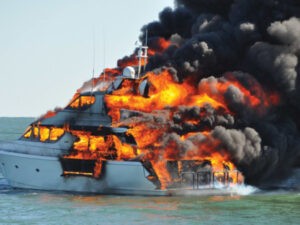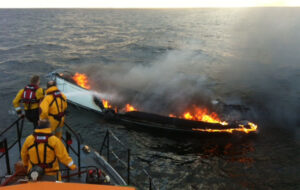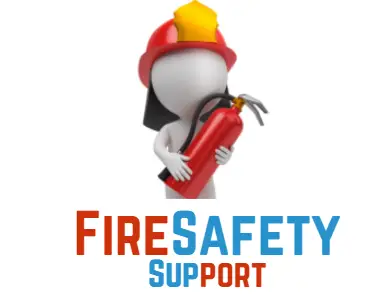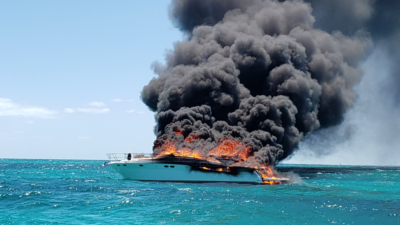One of the things you never want to experience when on your boat is a fire outbreak. While some occur without notice, some are as a result of ignoring the signs and symptoms. However, in the event of a fire outbreak while in your boat, the question is, what should you do if the motor on your boat catches fire?
The first thing to do is turn off the ignition. Then, if possible, try to douse the flames in water or with a fire extinguisher. If you can’t reach the flames, get everyone off of the boat as quickly as possible and call 911 from a safe distance.
Your first line of safety is having your fire extinguisher in your boat. It is a necessity for anyone to have one in the boat. Also, you need to know how to use one, and this page covers all that you need to know to stay safe in such a situation whereby your boat is on fire.
7 Causes of fire on the boat
There are many causes of fire on the boat. Fire can be caused by cigarette butts, matches, or any other source of ignition. Some people may consider this to be a problem, but it is not.
The best way to prevent fire is to make sure that you have a fire extinguisher in your boat. This will help you to put out any small fires before they get out of control and cause damage to your boat.
Some of the causes of fire include:
1. A lit cigarette
The most common cause of boat fires is a lit cigarette or cigar falling into an open flame such as an engine or heater. If you’re smoking onboard, be sure to extinguish your cigarette properly and never leave it unattended.
2. A cooking appliance catches fire.
One of the most common causes of boat fires is a cooking appliance catching fire. This can happen for a variety of reasons, including:
- The stovetop was left unattended and turned on, causing it to get too hot and ignite.
- The stovetop was left unattended while cooking something with grease or oil in it, which then caught fire.
- Someone accidentally knocked over an open flame onto the floor or countertops.
3. An electrical wire overheats and starts a fire in the wiring system
One of the most common causes of fire on a boat is overheating. Electrical wires are especially susceptible to overheating, which can cause them to catch fire. If your boat has a faulty electrical system, you should have it inspected as soon as possible by a professional.
A chemical reaction occurs between two chemicals that react with each other, creating heat and eventually catching something else on fire.
4. An electrical short circuit
An electrical short circuit is the most common cause of a fire on boats. This can happen when a wire gets damaged or when two wires touch each other and create an electrical pathway. If this happens, it may cause a spark, which could ignite the flammable materials around it.
5. Overheating of the engine
Overheating of the engine is one of the most common causes of fire on a boat. This occurs when there is no adequate cooling system or when there is an overuse of the engine.
If you notice that your engine is running hot, stop immediately and check for obstructions in the cooling system. Next, check for any leaks or damage in the exhaust system. If everything looks okay, but the temperature still rises, then you may need to replace your thermostat or water pump.
Another common cause of a fire on a boat is a faulty fuel injector. If you’re using a diesel engine, this can be caused by bad fuel or a clogged fuel filter. If you’re using an internal combustion engine, this could be caused by old spark plugs or bad fuel injectors.
6. The wrong type of fuel used in an engine
Also, one of the common causes of fire on the boat is the wrong type of fuel being used in an engine. The oil and gasoline must be compatible, and if they are not, it can create a fire hazard. Other causes include a dirty or clogged fuel filter, which can lead to oil getting into the carburetor and creating a fire hazard.
7. Overloading of the boat
Overloading of the boat is one of the major causes of fire on a boat. This can happen when the load that is being carried on board is too heavy and exceeds the capacity of the vessel. Overloading can also occur when there are too many passengers, or their luggage is too heavy.

5 Symptoms of fire on the boat
Fire is the enemy of any boat owner. It can be difficult to spot, and it can spread quickly. Here are some signs that your boat might be in danger:
1. Smoke coming from the engine room
If you see smoke coming from the engine room, this means there is a fire on your boat. When this happens, it can be very dangerous for you and your family. You need to get everyone off of the boat as soon as possible.
You should also turn off all electrical equipment on board, including radios and televisions. This will help prevent an explosion on board your vessel, which could lead to an even more dangerous situation.
If the fire is not contained in time, it could spread throughout your boat and burn everything down.
2. Fumes being released into the interior of the boat
If you’re on a boat, and you start to smell fumes in the interior of the boat, it could be from a fire. If you notice this, get everyone off of the boat as quickly as possible.
3. Flames burning through the wall of the cabin
If you ever see flames burning through the wall of your cabin, you should immediately grab a fire extinguisher and spray it at the flames. If that doesn’t work, get off the boat and wait for help.
4. Flickering lights or melted wires
In addition, one of the common symptoms of fire is flickering lights, which may be caused by melting wiring from a sparking electrical connection. This can be a small fire that you can extinguish, or it may threaten to spread in minutes.
5. Spontaneous combustion
A fire on board the boat can cause a chain reaction that could threaten your life. It is necessary to follow safety precautions while on the boat and maintain an appropriate level of vigilance to avoid serious injuries or death.
What should you do if a fire breaks out in the front of your boat?
If you find yourself in a situation where a fire is breaking out in the front of your boat, the best thing to do is to get off of it as quickly as possible.
If you’re not sure how to get off, there are a few different options:
1) You can use an inflatable raft or life preserver if you have one on board. This should be located near the bow of the boat and will allow you to float away from danger.
2) If you don’t have an inflatable raft or life preserver on board, you can use any other flotation device that might be available, as this could include life jackets or even just large pieces of Styrofoam, which could help keep you afloat long enough until help arrives.
3) If there’s no time for anything else, then try to swim away from the area where your boat is burning as quickly as possible; this is risky because it puts you at risk of drowning if water floods into your boat while it’s burning.
4) If possible, you should call 911 and let them know what’s happening. If you can’t get to land right away, stay with your boat until help arrives.

What should you do immediately if a boat motor catches fire?
If you’re out on the water and your boat’s motor catches fire, it’s important to stay calm and take the following steps:
- Isolate the area of the fire. If possible, move away from other boats or people.
- Call 911 and give them as much information as possible, including your location and how many people are on board with you. If there is a flare-up or explosion, move away from the area immediately.
- Turn off all electrical power to your boat, including fuses and batteries, if possible (if not, then at least unplug all electronic devices).
- Use a fire extinguisher if one is available; otherwise, use buckets of water to put out flames (do not try to use foam or dry powder extinguishers).
What should you do if a fire breaks out in the back of your boat?
If a fire breaks out in the back of your boat, there are a few things you should do to ensure your safety and the safety of those around you.
First, get everyone off the boat as quickly as possible. If it’s possible to get everyone off safely, do so. If not, it’s recommended that you stay on board and try to put out the fire yourself if you have enough time.
If someone is trapped on board, call 911 immediately and have them send firefighters or paramedics who can help rescue him or her.
If there are no other people on board with you, try to find some sort of water source nearby, such as a lake, pond, stream, or even a bucket, and start putting out the fire with that water source.
Once the fire is out (or if it never started), go back inside the boat and make sure there are no more flames or smoke coming from anywhere else in the boat before getting back on board yourself.
Where should fire extinguishers be stored on a boat?
Fire extinguishers are a crucial safety item for any boat. It’s important to have them in the appropriate place so that they can be accessed at all times.
Here are some tips on where to store fire extinguishers on your boat:
- Keep them near the galley (kitchen) or stove so that you can access them if there’s a grease fire or other flammable material catches on fire.
- Keep them near the engine room so that you can put out any oil fires that may occur when working with machinery in this area of the boat.
- Keep them near your sleeping quarters so that you can use them quickly if one of your guests has an accident while they’re sleeping and starts a fire in their cabin or bunk bed.
The fire safety equipment you need on a boat
When you’re out on the water, it’s important to have proper fire safety equipment in case of an emergency. Here are some of the most common pieces of equipment you’ll want to make sure your boat has:
- Fire extinguishers
- Smoke detectors
- Carbon monoxide alarms (if you have a generator)
- A first aid kit
Boat fire safety tips
Safety is always the first priority when you’re on the water, but it’s especially important to stay safe if you’re in a boat fire. In the event of a fire on your boat, you need to be prepared. There are many things you can do to protect yourself and your passengers, as well as to minimize the damage that a fire can cause.
Here are some tips:
- Keep matches, lighters, and candles out of reach from children.
- Put smoke alarms on every deck of your boat. It is also recommended that you have a carbon monoxide alarm in the engine room.
- Install sprinklers in any area where there is oil or fuel stored or used regularly (like the engine room). Sprinklers will put out the fire before it spreads throughout the entire boat.
- Have a working fire extinguisher readily available on board at all times.
- Call 911 immediately and let them know what happened so they can send help as quickly as possible.
Conclusion
As a boat owner, you know how important it is to keep your boat safe from fire. Fire can be dangerous for you, your family, and the environment. It can also be expensive to repair damage from a fire. It’s important to be aware of the risk of fire on boats so that you can take steps to prevent it.
So, this post on what you should do if the motor on your boat catches fire explains all that you can do in such a deadly situation.


